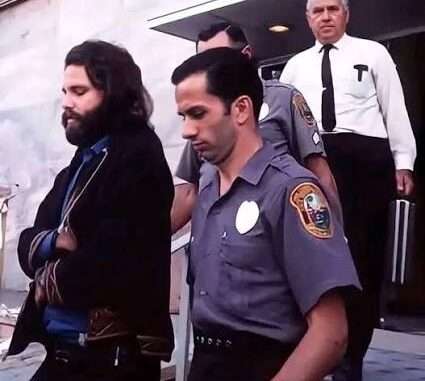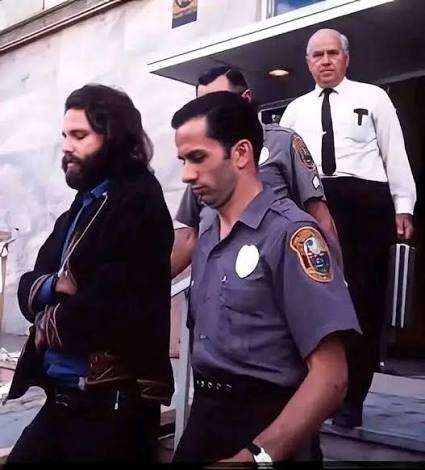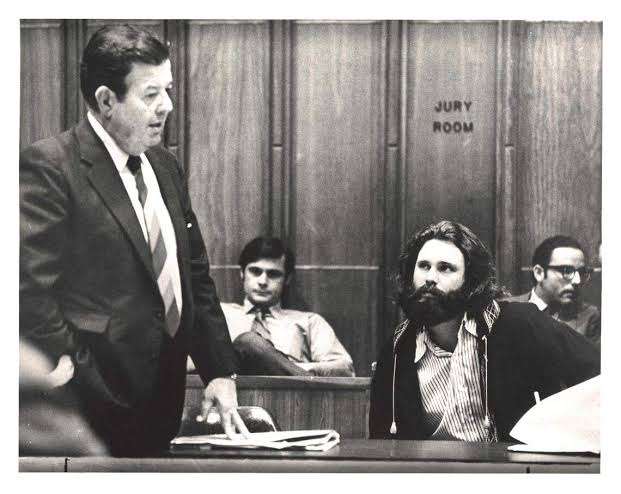
In March 1969, **Jim Morrison**, the enigmatic frontman of **The Doors**, found himself at the center of one of rock music’s most infamous scandals. Known for his poetic lyrics, unpredictable stage presence, and defiance of authority, Morrison’s career was forever shadowed by the events of a chaotic Miami concert—an incident that led to his conviction for indecent exposure and profanity.
The Miami Show: Chaos at Dinner Key Auditorium
On March 1, 1969, The Doors were scheduled to perform at the Dinner Key Auditorium in Coconut Grove, Miami. The venue, overcrowded and sweltering, quickly became a powder keg. Morrison, already battling personal demons, appeared intoxicated and restless on stage. Instead of delivering a typical performance, he taunted the audience, shouting obscenities and challenging their expectations.
Witnesses claimed Morrison exposed himself during the show, though no photographic evidence has ever surfaced. What was certain was the outrage that followed. The Miami Herald and local officials decried the performance, calling it lewd and indecent, and within days, Morrison faced a barrage of legal trouble.
The Trial and Conviction
By September 1970, Morrison was standing trial in Miami. The charges included lewd and lascivious behavior, indecent exposure, open profanity, and public drunkenness. Despite 
Morrison received a sentence of six months in jail and a \$500 fine. His lawyers immediately filed an appeal, and Morrison remained free on bail as the process unfolded.
An Appeal Never Heard
The conviction left Morrison deeply unsettled, though he wore his defiance like armor. Behind the scenes, however, he was drained. The relentless media scrutiny, ongoing battles with alcohol, and the looming legal consequences weighed heavily on him.
In 1971, Morrison traveled to Paris with his longtime partner Pamela Courson, seeking refuge and inspiration. It was there, before the appeal could be resolved, that Morrison died on July 3, 1971, at just 27 years old. His cause of death remains shrouded in mystery, with official records citing heart failure but rumors persisting about drug use and foul play.
Because of his untimely passing, the appeal was never heard, and the conviction technically remained on the books until December 2010, when outgoing Florida Governor Charlie Crist granted Morrison a posthumous pardon.
 Legacy of the Conviction
Legacy of the Conviction
The Miami incident was a turning point in Morrison’s life and career. It highlighted the growing tension between rock musicians and authorities during the late 1960s, a period when youth culture and rebellion clashed with conservative values. For many fans, Morrison’s trial was less about alleged misconduct and more about silencing an artist whose very essence challenged the status quo.
While the controversy tarnished his reputation at the time, history has largely reframed the event as part of Morrison’s mythos—the tale of a performer who lived and died on the edge, never fully constrained by law, convention, or society’s expectations.
Even today, debates continue about what really happened that night in Miami. But what remains undeniable is that Jim Morrison, guilty or not, cemented his place as one of rock’s most compelling and misunderstood figures—a man whose life, art, and controversies remain inseparable.
Leave a Reply